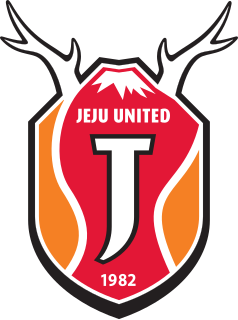
The K League 1 is a South Korean association football league that serves as the top-tier of the South Korean football league system. The league is contested by twelve clubs.

FC Seoul is a South Korean professional football club based in Seoul, the capital of South Korea, that plays in the K League 1. The club is owned by GS Sports, a subsidiary of GS Group.

The Jeju United Football Club is a South Korean professional football club. The club is based in Seogwipo, Jeju Province, South Korea. In the past, the club has been known as the Yukong Elephants Football Club and Bucheon SK.

The Dongdaemun Stadium, was a sports complex in Seoul, South Korea and included a multi-purpose stadium, a baseball park and other sports facilities. It was located near the Dongdaemun or Great East Gate and the surrounding Dongdaemun market and had many vendors selling athletics-related goods. It was demolished in 2008 to make way for the Dongdaemun Design Plaza & Park.
2000 AFC Asian Cup qualification is the qualification process organized by the Asian Football Confederation (AFC) to determine the participating teams for the 2000 AFC Asian Cup.
Korean League Cup 1993, known as Adidas Cup 1993 due to the competition's sponsorship.
The 1985–86 Asian Club Championship was the 5th edition of the annual Asian club football competition hosted by Asian Football Confederation. The tournament returned to Asia for the first time in 14 years. Several Asian clubs started the qualifying round in Fall of 1985. The final tournament was held in Jeddah, Saudi Arabia from 19 to 29 January 1986.
Korean Super League 1983 was first ever season of top football league in South Korea. Total 5 teams are participated in the league. Two of them are professional teams, three of them are amateur teams.
Korean Super League 1984 was second season of top football league in South Korea. Total 8 teams are participated in the league. Six of them are professional teams, two of them are amateur teams.
The Korea Professional Football League 1986 was fourth season of top football league in South Korea. The Korea Professional Football League was introduced for this season, having been previously known as the Korean Super League.
The 1995 K League was the 13th season of K League since its establishment in 1983.
The K League All-Star Game is an annual exhibition match organised by the Korea Professional Football League. Inaugural match was held in 1991.
Football is one of the most popular sports, both in terms of participants and spectators, in Seoul. Seoul had several of South Korea's leading football clubs and biggest football stadium - Seoul World Cup Stadium.

At the end of 1995 the side moved from the Dongdaemun Stadium in Seoul to the Mokdong Stadium on the western edge of Seoul, as part of K-League's decentralization policy.
This article documents the history of FC Seoul, a Korean association football club based in Seoul. For a general overview of the club, see FC Seoul.
1984 K League Championship is postseason championship playoff matches contested by the first stage winner and second stage winner in the 1984 K League. Final is played over two legs.
On 1 November 1988, Tongil Sports Co., Ltd. announced the organization of Ilhwa Chunma Football Club and chose Dongdaemun Stadium in Seoul as its home stadium. Then on 18 March 1989, 108 days after the announcement, the organizing ceremony was held at the Sheraton Walkerhill Hotel in Seoul. Ilhwa Chunma participated in its first season as the 6th professional football team of Korean Professional Football League.
The 1983 season was Daewoo's first ever season in the Korean Super League in South Korea. Daewoo competed in League.

Busan IPark is a South Korean professional football club based in Busan, South Korea that currently competes in the K League 2. Its current home ground is Busan Gudeok Stadium. The club was one of the original five members of the K League and continuously competed in the first division from 1983 to 2015, when they were relegated. Initially, the club was simply called Daewoo in reference to the company that originally owned and financed it. Today they receive financial backing from the HDC Group.
Listed below are the dates and results for the 1970 FIFA World Cup qualification rounds for the Asian and Oceanian zone . For an overview of the qualification rounds, see the article 1970 FIFA World Cup qualification.






